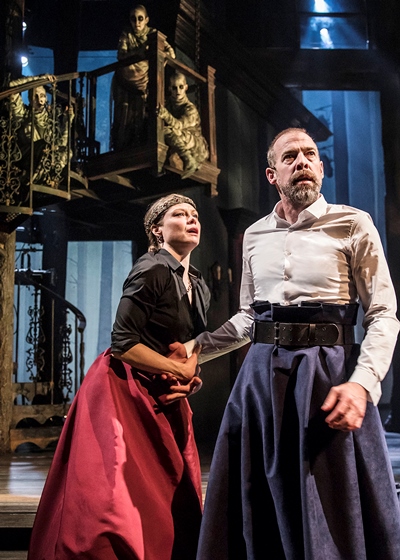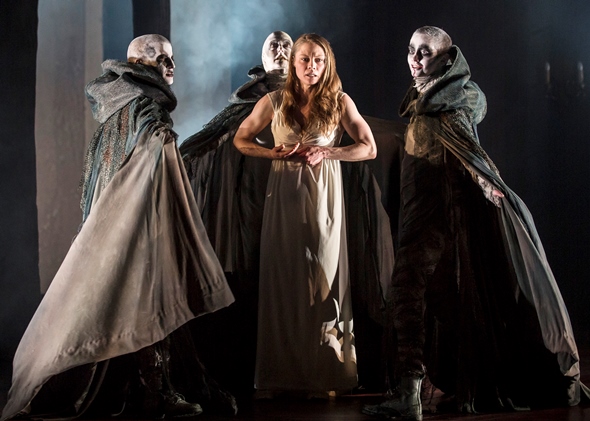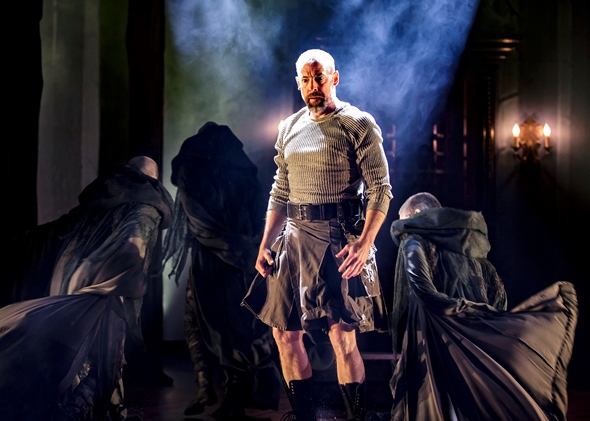‘Macbeth’ at Chicago Shakespeare: Like a hell-broth, boil and bubble – and mix this magic in
Review: “Macbeth” by William Shakespeare, at Chicago Shakespeare Theater through June 24. ★★★★
By Lawrence B. Johnson
If ever there was a play meant for the sleight of Teller’s magicianly hand, it is Shakespeare’s “Macbeth.” The Scottish tragedy is all about what appears to be there, but is not. Ambiguity, misdirection, illusion: This is the stuff of “Macbeth,” and it forms the clever heart of the play’s current incarnation at Chicago Shakespeare Theater.
I should hasten to add that Teller is only co-director; his fellow conspirator is Aaron Posner, whose invisible hand operates more on the dramatic side of events and indeed quickens both the show’s pace and the viewer’s pulse. This is a brisk “Macbeth,” crisp and concentrated and over before you know it. Poof.
 The real trick of “Macbeth” is to establish first the bravery, loyalty, even the fundamental goodness of Macbeth, a veteran general in the service of King Duncan. He holds the title Thane of Glamis (pronounced Glahmz). His best friend is another general, Banquo. But that friendship cracks when good Macbeth becomes infected by the virus of suggestion and succumbs to the allure of power. Prodded by the greater ambitions of his wife, Lady Macbeth, the deluded thane plunges into bloody mayhem and ruin.
The real trick of “Macbeth” is to establish first the bravery, loyalty, even the fundamental goodness of Macbeth, a veteran general in the service of King Duncan. He holds the title Thane of Glamis (pronounced Glahmz). His best friend is another general, Banquo. But that friendship cracks when good Macbeth becomes infected by the virus of suggestion and succumbs to the allure of power. Prodded by the greater ambitions of his wife, Lady Macbeth, the deluded thane plunges into bloody mayhem and ruin.
In Ian Merrill Peakes’ mercurial Macbeth, we observe such a credible fool. This battle-hardened but gullible man is manipulated by three mystical soothsayers, the weird sisters, as easily as the too proud Malvolio is deceived by his adversaries in “Twelfth Night.” When in the foggy aftermath of battle, the witches greet Macbeth first as Glamis, then broaden their salutation to Thane of Cawdor and cap it off by hailing him as king to be, he is flummoxed. Another man holds the title of Cawdor, so what gives?
It turns out Cawdor has betrayed the king and therefore was summarily executed, his title and holdings conveyed to the hero of this day’s fighting, Macbeth. So the weird sisters were correct. And king to be? What of that? All this Macbeth recounts in a letter sent post-haste to Lady Macbeth, whom we first meet reading the report and relishing its implications. Better still, she learns that King Duncan (Christopher Donahue) will be her overnight guest. This circumstance is a gift. It’s time to take prophecy in hand.
 Her first speech defines Lady Macbeth, who would have the gods “unsex” her so that she might lead what may follow with a man’s strength. She also tells us that her husband – this great warrior – sometimes lacks the pluck to act in his own best interests. On opening night, I found Chaon Cross not yet settled in the soliloquy that elaborates on Lady Macbeth’s reading of the letter. The weight of her words, their measure and calculation, wanted the gut impulse and conviction of this grasping creature who has just read, essentially, an invitation to seize the crown.
Her first speech defines Lady Macbeth, who would have the gods “unsex” her so that she might lead what may follow with a man’s strength. She also tells us that her husband – this great warrior – sometimes lacks the pluck to act in his own best interests. On opening night, I found Chaon Cross not yet settled in the soliloquy that elaborates on Lady Macbeth’s reading of the letter. The weight of her words, their measure and calculation, wanted the gut impulse and conviction of this grasping creature who has just read, essentially, an invitation to seize the crown.
But thereafter, as Lady Macbeth watches her ascendant husband’s torment and soon loses her own bearings in the rising tide of blood, Cross conveyed all the desperation, despair and guilt of a woman who – like Macbeth himself – has grievously miscalculated the cost of their usurpation. If Macbeth soon realizes he is so steeped in blood that his only way forward is more blood, Lady Macbeth drowns in its broad, thick flow.
 Cross plays her two other key scenes with blazing truth: Lady Macbeth’s frantic attempts to explain away her husband’s manic outbursts before astounded guests when he imagines seeing the ghost of the murdered Banquo, and her guilt-induced sleeping walking when she tries in vain to expunge the damn’d spot of blood – which in one of Teller’s most brilliant effects soon engulfs her arms and splatters her nightgown.
Cross plays her two other key scenes with blazing truth: Lady Macbeth’s frantic attempts to explain away her husband’s manic outbursts before astounded guests when he imagines seeing the ghost of the murdered Banquo, and her guilt-induced sleeping walking when she tries in vain to expunge the damn’d spot of blood – which in one of Teller’s most brilliant effects soon engulfs her arms and splatters her nightgown.
It is the banquet scene on which the play pivots. Macbeth has ordered the murder of his best friend, worthy Banquo (Andrew White), because the weird sisters have declared that Banquo, not Macbeth, will sire a line of great kings. Teller makes bloodied Banquo appear suddenly on the throne, though only distraught Macbeth can see him. Peakes’ anguished thane-become-king summons all the horror of a man who has lost touch with reality, or rather one who has come face to face with his awful deed and cannot turn from it: “Thou canst not say I did it; never shake thy gory locks at me!” Banquo’s very presence to Macbeth’s mind is the slain man’s reply.
Rather like Hamlet’s “To be or not to be,” Macbeth’s existential soliloquy on the sound and fury and nothingness of life poses a formidable challenge to any actor, knowing his audience could more or less recite along. There was something stripped down, raw, starkly fatalistic in Peakes’ speech, into which Macbeth drifts upon hearing of Lady Macbeth’s death: “She should have died hereafter. There would have been time for such a word: tomorrow.” For Macbeth, there are only yesterdays, all those “yesterdays that have lighted fools the way to dusty death. Out, out, brief candle!” Peakes’ delivery was casually reflective, almost indifferent and absolutely gripping.
 The production’s aura of mystery, of mysticism and magic, became pervasive in the nearly constant presence of the three weird sisters — McKinley Carter, Theo Germaine and Emily Ann Nichelson – all marvelously got up in ghastly aspect by costumer Mara Blumenfeld. We might have been looking through their prism: They were everywhere.
The production’s aura of mystery, of mysticism and magic, became pervasive in the nearly constant presence of the three weird sisters — McKinley Carter, Theo Germaine and Emily Ann Nichelson – all marvelously got up in ghastly aspect by costumer Mara Blumenfeld. We might have been looking through their prism: They were everywhere.
I was less keen about the breaking of the fourth wall that sent Matthew Floyd Miller’s importuned Porter cavorting about the audience, complaining (per the text) about the damnable knocking at the door this early morning, but also interacting with the audience. This ill-considered diversion did exactly that; it took us out of the play. The bit is quite funny, and provocative, played by the book. This was ham-handed and muddle-headed.
The show works wonderfully well in CST’s new space, The Yard, which reminded me – in its present configuration – of the Globe in London, albeit with a roof added. There’s palpable angst and energy in the production, the large cast is roundly engaging and Daniel Conway’s set is at once evocative and functional. The Teller factor puts the whole enterprise over the top. Is that in fact a dagger floating before Macbeth? And seriously, what became of the weird sister who was standing there a second ago? Poof.
Related Link:
- Performance location, dates and times: Details at TheatreInChicago.com
Tags: Aaron Posner, Andrew White, Chaon Cross, Chicago Shakespeare Theater, Chrisopher Donahue, Daniel Conway, Ian Merrill Peakes’, Macbeth, Mara Blumenfeld, Matthew Floyd Miller, Teller



